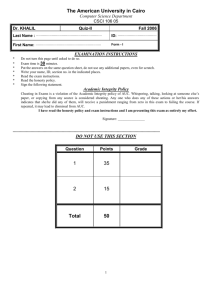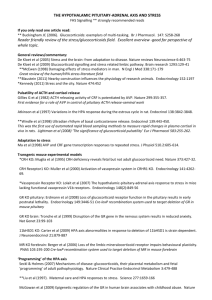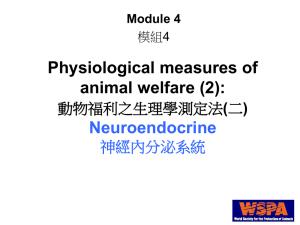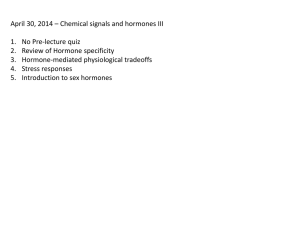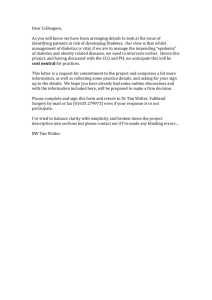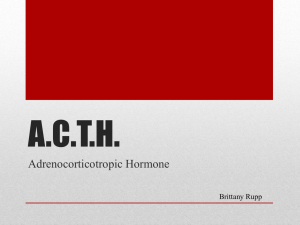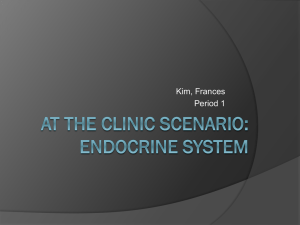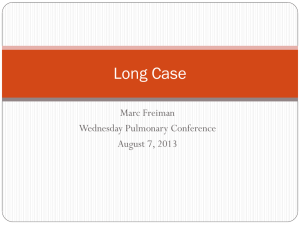Neuroendocrine Imbalance in Patient Care
advertisement
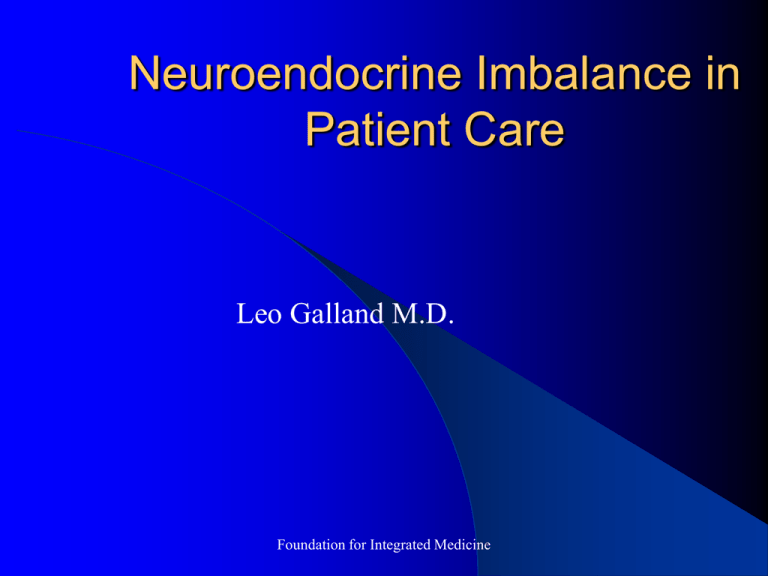
Neuroendocrine Imbalance in Patient Care Leo Galland M.D. Foundation for Integrated Medicine CLINICAL VISION IS WHAT THE DOCTOR SEES Foundation for Integrated Medicine Conventional Medical Vision • People become sick because they develop diseases. The doctor looks for the disease that occupies the patient. The name of this disease becomes the diagnosis and the basis for treatment. Foundation for Integrated Medicine Another Way of Seeing People become sick because of disharmonies and imbalances, which may involve: Social relationships, environmental assaults, problems of diet, lifestyle, behavior and belief systems, and disturbances in the flow of energy and information within the individual. The healer’s job is to identify and help the patient correct these. Foundation for Integrated Medicine Central Systems Mediate Functions Needed for Coordinated Behavior of the Whole Organism • Systems relating brain and body -Autonomic nervous system -Neuroendocrine system -Neuroimmune system Systems within the brain -Specific and diffuse transmitter systems -Distributed systems Foundation for Integrated Medicine Central Systems Are Difficult to Localize and Measure Their output may be too widespread to characterize adequately. Their actions may persist for days, months or years. Although behaviors generated by central systems can be observed and classified, their neural substrates may be elusive. Shepherd, Neurobiology 1994, Chapter 24 Central Systems Interact with One Another Continuously Immune responses alter neuroendocrine function. Endocrine responses alter neuroimmune function. Neuroendocrine responses alter autonomic nervous system function. Foundation for Integrated Medicine Neuroendocrine Regulation Maintains Homeostasis in Response to Stressors Prolonged stress causes allostasis, a new equilibrium significantly different from the resting state: levels of important physiologic mediators are altered. Neuroendocrine imbalance is one manifestation of allostasis. Foundation for Integrated Medicine Neuroendocrine Imbalance Is a disruption in the flow of information among cells and between organs. Is not a specific disease but may complicate many different diseases. Foundation for Integrated Medicine Glands and Hormones Anterior pituitary Posterior pituitary/ neurointermediate lobe Pineal Thyroid Parathyroid GH, PRL, ACTH, TSH, FSH, LH Arginine vasopressin, oxytocin, endorphins, enkephalins Melatonin T4, T3, calcitonin PTH Foundation for Integrated Medicine Glands and Hormones Heart Adrenal cortex Adrenal medulla Kidney Skin ANF Glucocorticoids, mineralocorticoids, androgens epinephrine, norepinephrine Renin, calcitriol Vitamin D Foundation for Integrated Medicine Glands and Hormones Liver/lung Pancreas GI tract Gonads Lymphocytes, macrophages Angiotensin Insulin, glucagon CK, VIP, bombesin, somatostatin Estrogen, progesterone testosterone Cytokines Foundation for Integrated Medicine Hypothalamic Neuropeptides CRF GnRF TRH GHRF, GHIF PRF, PIF Neuropeptide Y Leptin Foundation for Integrated Medicine Classic Neurotransmitters Catecholamines: DA, NE, EPI Indoles: 5 HT, Melatonin ACh Amino acids: GABA, Glutamate, Aspartate Foundation for Integrated Medicine Biological Rhythms Reflect Anticipatory Homeostasis Dark increases melatonin which induces sleep. Rest increases PRL which increases REM sleep. CRH, vasopressin and neuropeptide Y increase during sleep, preparing for increased brain activation and foodsearching behaviors on awakening. Foundation for Integrated Medicine Sleep Patterns Are Determined by the Immune System IL-1 induces Stage 4 sleep and stimulates the HPA axis. In health, IL-1 production is cyclic. It is stimulated by muramyl peptides derived from normal gut microflora. It is inhibited by glucocorticoids. Foundation for Integrated Medicine REGULATORY PATHWAYS • NE enhances hypothalamic CRH. • Serotonin enhances ACTH secretion: 5HT deficits impair HPA output. NE neurons stimulate TSH: Adrenergic deficits impair HPT responses. Thyroid deficit impairs adrenergic function. Foundation for Integrated Medicine Vasopressin and the Brain VP mimics/enhances CRH effects. Under stress, some VP neurons produce CRH. Testosterone increases VP synthesis; some testosterone-induced aggressive behaviors may be VP mediated. NE increases CRH and VP production. Glucocorticoids decrease CRH/VP production in the hypothalamus, not the amygdala. Foundation for Integrated Medicine INFLAMMATORY MEDIATORS MAY ALTER NEUROENDOCRINE FUNCTION CYTOKINES PROSTANOIDS ENZYMES MONOAMINES VARIOUS PEPTIDES Foundation for Integrated Medicine EFFECTS OF INFLAMMATION Altered protein synthesis Neuroendocrine changes Hematopoietic changes Metabolic changes Altered micronutrient levels: zinc, iron , copper, magnesium, retinol, glutathione Foundation for Integrated Medicine NEUROENDOCRINE EFFECTS Fever, somnolence, anorexia HPA axis stimulation Increased arginine vasopressin secretion Inhibition of IGF-1 synthesis Increased adrenal catecholamine secretion Foundation for Integrated Medicine Autonomic Dysregulation Neurally-mediated hypotension Sympathetic hyperreflexia Parasympathetic hypertonus Drug induced Denervation Classic dysautonomias Foundation for Integrated Medicine Tests of the HPA Axis • Serum cortisol at 800, 1600, 2400 • Cortisol response to ACTH • • • • ACTH response to CRH Serum DHEA-S 24 hour urine for cortisol, DHEA Dexamethasone suppression Foundation for Integrated Medicine Tests of the HPT Axis T4, T3, TSH (third generation) TSH response to TRH Urinary excretion of T3, T4 ? Foundation for Integrated Medicine References for Neuroendocrine Testing Dons RF: Endocrine and Metabolic testing Manual, CRC Press, Third Edition 1998. Svirbely JR & Sriram MG, The Medical Algorithms Project. www.medal.org.ar/chapters/index.html (Chapter 13) Foundation for Integrated Medicine Clinical Indicators Fatigue (conditional, fluctuating) Exercise intolerance Temperature intolerance (hot/cold) Abnormal temperature control Disordered patterns of sleep, appetite Difficulty losing/gaining weight Cardiac symptoms Foundation for Integrated Medicine Physical Findings Temperature, pulse, blood pressure Orthostatic change in pulse, blood pressure Pulse change with forceful handgrip Foundation for Integrated Medicine Women with PMS Have Impaired Serotonin Circuits Women with PMS have an impaired serotonin response to tryptophan and a blunted cortisol response to serotonin. Impoved function of serotonin-dependent pathways improves premenstrual symptoms. Foundation for Integrated Medicine Impaired Utilization of Tryptophan in Women with PMS Intravenous tryptophan produced a smaller elevation of whole blood serotonin in women with PMS than in controls. This effect occurred only during the luteal phase. Does it explain the carbohydrate cravings that are so common at this time? Rasgon et al, Fertil Steril 2000 The HPT Axis Is Often Abnormal in Depression 10% of hospitalized patients are hypothyroid (TSH stimulation). For others, TSH response to TRH is blunted, due to abnormal neurotransmission. T3 is an effective anti-depressant, whatever the neuroendocrine responses. Foundation for Integrated Medicine The HPA Axis Shows Loss of Negative Feedback in People with Depression Urine free cortisol is elevated, especially when stressors cannot be controlled. Diurnal pattern may be disrupted, with increased PM cortisol secretion. Dexamethasone suppression is blunted. Spinal fluid CRH is elevated (also in OCD and post-traumatic stress disorder). Foundation for Integrated Medicine The Amygdala and Allostasis Receives information from all neocortical sites and visceral input from brainstem. Involved in emotional memory. CRH production here is up-regulated by glucocorticoids. Increased activation occurs in depression. CRH in the brain induces fear, withdrawal. Foundation for Integrated Medicine EFAs and Depression Impaired synaptic function due to a deficit of omega-3 essential fatty acids (EFAs) may contribute to the pathogenesis of CNS disturbances in depression. (1) Maes M. Et al. Psychiatry Res (1998). (2) Peet M et al. Biol psychiatry (1998). (3) Adams PB. Lipids (1996). Foundation for Integrated Medicine The HPA Axis in CFIDS Cortisol response to exercise is blunted. ACTH response to CRH is blunted. As if patients are withdrawing from exogenous steroids. DHEA response to ACTH is impaired. Low dose cortisone improves symptoms but aggravates HPA suppression. Foundation for Integrated Medicine T-Helper Cells in CFS Patients are Ultrasensitive to Glucocorticoids CD-4 lymphocytes from patients produce less gamma-interferon than controls. Inhibition of cell proliferation and production of gamma-interferon or IL-4 was produced at 5-10% of the dose of dexamethasone required for controls. Visser et al, J Infect Dis 1998 Hypotension in CFIDS Delayed orthostatic hypotension is common. Fludrocortisone was ineffective in a controlled study. Sodium loading relieves symptoms, perhaps by stimulating vasopressin synthesis. Foundation for Integrated Medicine Oral NaCl Improves CFS Symptoms One third of CFS patients had abnormal tilt table tests. Sustained release NaCl, 1200 mg daily for 8 weeks improved tilt table responses and symptoms in 50% of these. Non-responders had low plasma renin activity. DeLorenzo et al, Clin Auton Res 1997 Desmopressin improves HPA Response to CRH in CFS Patients with CFS have an impaired ACTH and cortisol response to CRH. Desmopressin (a vasopressin analogue) restores this to normal. Scott et al, Biol Psychiatry 1999 Clinical Approaches Symptom analysis: - Fatigue (conditional, fluctuating) - Exercise intolerance -Temperature intolerance • Physical findings: -Unstable blood pressure -Inappropriate temperature Foundation for Integrated Medicine Dietary Influences High protein, low carbohydrate diets may decrease serotonin availability and deplete volume. Omega-3 EFA deficit may impair serotonin activity. Low sodium, high water intake depresses vasopressin synthesis. Foundation for Integrated Medicine Substances That May Enhance HPA Activity Sodium Phosphatidyl serine Siberian ginseng Maca Serotonin enhancers Foundation for Integrated Medicine Substances That May Inhibit HPA Activation Water Benzodiazepines Exogenous steroids Foundation for Integrated Medicine When Your Favorites Treatments Don’t Work… They may have undesirable neuroendocrine effects. More time may be required because the effects of central systems can be prolonged. Foundation for Integrated Medicine
